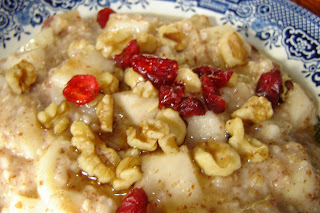I recently read this book written by Dr. Bob Arnot. Dean Ornish recommended this book be read by all women, and since I am a woman... What woman doesn't think about breast cancer? Those little pink ribbons are everywhere these days!
This is a fantastic compilation of the latest research in breast cancer up to it's publishing in 1998. And still a great guide to making healthy dietary choices. Many of the recommendations are consistent with the measures recommended to prevent heart disease, diabetes and colon cancer, so it's hard to argue them: avoid alcohol, exercise, control body fat, eat lots of fibre and cruciferous vegetables, avoid high glucose processed foods and foods likely to contain chemical estrogens and pesticides.
But there were a few recommendations made that are worth extra consideration. Dr. Bob recommends eating 35 to 60 grams of soy containing genistein per day to help block the estrogen receptors in breast tissue. One cup of firm tofu contains about 31 grams of soy protein. A half cup of dry roasted soy beans contains almost 40 grams of soy protein. A half cup of soy milk has 2.8 grams. The second breast cancer prevention food is flax seeds. The book recommends eating 25 grams of ground flax seed on cereal, or salad or in a smoothie or wherever you can sneak it in. Flax seeds are rich in omega-3 fatty acids and have even been shown to shrink the size of breast tumours! I'm sold.
Next, avoid omega-6 fatty acids (poly-unsaturated fats) and consume more omega-3 fatty acids. Where do you find omega-6 fatty acids? Mainly in margarine, mayonnaise, commercial salad dressings, safflower oil, corn oil, soybean oil, peanut oil, cottonseed oil, grapeseed oil, borage oil, primrose oil, sesame oil and anything containing trans fats. Saturated fats should also be avoided because of their ability to raise insulin levels. Evidence has shown that breast cancer incidence increases with blood insulin levels.
Dr. Bob recommends taking fish oil capsules to consume an abundant supply of omega-3 fatty acids. I wondered why he recommended fish oils, when flax seeds are rich in omega-3 fatty acids and have other amazing breast health benefits. Later in the book when he mentioned he was an avid sport fisherman it made more sense. This is one recommendation that I find a bit counter intuitive since fish get their omega-3s from aquatic plants, and tend to bioaccumulate and bioconcentrate fat soluble toxins in their fatty tissues. Perhaps he could have recommended more options to get your omega-3s.
Another interesting fact presented in the book is that the earlier you begin following the breast cancer prevention diet, the higher the prevention benefit. The development of the breast begins before birth, but isn't fully complete until after a woman has given birth to a full term baby. The hormones and toxins that the breast tissue is exposed to during these developing years are thought to have an enormous impact on the incidence of breast cancer. So he recommends that our daughters follow the same dietary recommendations for breast cancer prevention.
At the end of the book, he recommends 2 breast healthy cuisines: Asian and Mediterranean. He also provides several meal ideas from each of these cuisines.
The book was informative, well organized, easy to follow and well referenced. A must read for those interested in taking control of their own heath.
 After dinner we walked down to the harbor and took in a play entitled 'Floating'; a comedy written and acted by Hugh Hughes in which a small island off the coast of Whales breaks free and floats around in the North Atlantic Ocean. It was creative and hilarious! One word of advice... be on time. Late comers were thoroughly interrogated at this show where the audience participation was encouraged, and ad libbing obviously came easily to these actors. This was the final of 5 shows in Toronto unfortunately, so you'll have to go oversees to see it now.
After dinner we walked down to the harbor and took in a play entitled 'Floating'; a comedy written and acted by Hugh Hughes in which a small island off the coast of Whales breaks free and floats around in the North Atlantic Ocean. It was creative and hilarious! One word of advice... be on time. Late comers were thoroughly interrogated at this show where the audience participation was encouraged, and ad libbing obviously came easily to these actors. This was the final of 5 shows in Toronto unfortunately, so you'll have to go oversees to see it now. 






